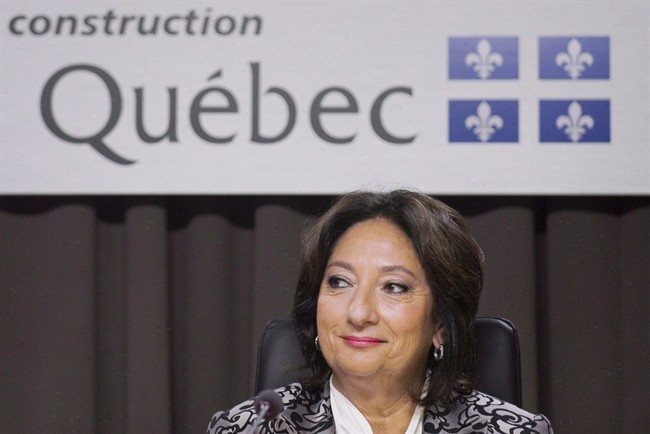MONTREAL – The Quebec Liberals had some of the province’s most influential construction and engineering executives signed up to raise funds on their behalf, the province’s corruption inquiry heard on its final day of public hearings.

The Charbonneau Commission broke for the summer on Wednesday after studying Liberal party fundraising tactics, including who was solicited and who collected funds.
The inquiry suggested the group included many former Charbonneau Commission witnesses, some of whom are facing criminal charges stemming from Quebec’s multitude of corruption-related investigations.
While issuing the fundraising certificates to those individuals in itself was not illegal, the woman in charge of fundraising for the Liberals during that time called it “disturbing” given the information that exists now.
Violette Trepanier was the fundraising head for about a decade. Commission counsel Paul Crepeau asked her thoughts after he filed into evidence copies of certificates formally recognizing the status of party fundraisers between 2007 and 2009.
Crepeau listed off names of those with certificates.
They included construction bosses Paolo Catania, Giuseppe Borsellino and Lino Zambito, who have all either testified or figured prominently in early testimony.
He also named engineering executives from Roche such Marc-Yvan Cote and France Michaud; the Sauriol brothers from Dessau and Riadh Ben Aissa, a former SNC-Lavalin vice-president charged in the $22.5 million fraud surrounding the building of Montreal’s English-language superhospital.
“Isn’t it disturbing for you to know that many of your canvassers in 2009 are linked to investigations, either in strawman schemes (discussed at the inquiry) or other illicit activities – in the case of Mr. Ben Aissa, we’re talking about fraud and money laundering,” Crepeau said. “Does this not worry you a little?”
Trepanier, who has spent two days defending her run as fundraising boss, said she was troubled by the information.
“I find it disturbing,” Trepanier told the inquiry. “I am extremely disappointed.”
The so-called strawman system allowed companies to use third parties to pose as donors and reimbursed them after the fact. It allowed for companies to get around stringent Quebec donating rules that have since been tightened further.
Official documents from Quebec’s chief electoral officer suggests the Liberals raised more than $95 million between 1996 and 2011 – the years that are covered under the Charbonneau Commission’s mandate.
Trepanier insisted her party did not solicit companies for money. She was in charge of fundraising from 2001 until the end of 2012, but remained evasive in her responses despite her lengthy experience.
Trepanier replied she had no explanation when Crepeau asked her why engineers donated 100 times more than those who work in other professions without access to lucrative government contracts.
Asked why names of companies often appear in Liberal party fundraising documents instead of individuals, Trepanier was adamant that the paperwork was not official party donation documents.
Corporate donations are illegal and Trepanier maintained the party solicited individuals at the companies. Confronted with other discrepancies in party documents, Trepanier chalked it up to administrative or clerical errors.
“If we had to do this again, we’d do it differently,” Trepanier said during her testimony. “Well, we’d do the same, but call it something else. We’d talk about people.”
Trepanier also testified that she didn’t follow up on who the donors were and whether they had an interest in obtaining a government contract.
“If I understand correctly, for you, it was about collecting money, no matter where it came from?” asked commission chair France Charbonneau.
“As long as it’s done legally, yes,” Trepanier replied.
The inquiry spent much of the sitting looking at political party financing and contracts involving the provincial Transport Department. Charbonneau announced the commission plans to hear from more witnesses in the fall for about two-to-three weeks.
Hearings are scheduled to resume on Sept. 2 or earlier, Charbonneau said.
Charbonneau said the inquiry, which has been studying corruption in the awarding of public contracts since 2012, will move to the consultation phase of its work in the fall.
The commission is expected to table a final report by April 2015.


Comments